Narration Rules With Example and Table
Narration rules (from direct to indirect) are a nice topic for learning English grammar. Here I have presented all the narration rules step by step in an easy way that will help you to learn narration change. After reading the article you can also teach someone.

What is Narration?
Narration is the way of presenting sentences spoken by somebody.
Well, let us discuss all the narration rules.
Narration Rules
When you will learn English grammar “Narration Change”, you have to remember some narration rules those will help you to be an expert in narration change. I have discussed all the narration rules step by step below.
- Change of tense
- Change of place and time
- Change of person
- Change of conjunction
- Change of reporting verb
Narration Rules For Tense
When we change direct speech into indirect speech, we must have to change the tense in some cases. I have explained all the rules thoroughly and given examples so that the learners can understand the narration rules in a very easy way.
Rule No. 01
| If the reporting verb is in the Present Tense, there is no change in the tense used in the reported speech when direct speech is transformed into indirect speech. |
Example:

Direct: The man says, “Playing cricket is my hobby.”
Indirect: The man says that playing cricket is his hobby.
Direct: The girls say to me, “You have supported us here.”
Indirect: The girls tell me that I have supported them there.
Rule No. 02
| If the reporting verb is in the Future Tense, there is no change in the tense used in the reported speech when direct speech is transformed into indirect speech. |
Example:

Direct: Ram will say, “I have done this work.”
Indirect: Ram will say that he has done that work.
Rule No. 03
| If the reporting verb is in the Past Tense, there is a change in the tense used in the reported speech when direct speech is transformed into indirect speech. |
Example:

Direct: Riya said, “I know the gentleman.”
Indirect: Riya said that he knew the gentleman.
Direct: Mitali said, “I am doing the sums now.”
Indirect: Mitali said that he was doing the sums then.
Rule No. 04
|
If we find reporting verb Past Tense and reported speech Past Tense in the direct speech, we change the Tense at the time of narration change. |
Example:

Direct: Mother said, “I cooked fish yesterday.”
Indirect: Mother said that she had cooked fish the previous day.
Direct: Liton said, “I was playing football in the field.”
Indirect: Liton said that he had been playing football in the field.
Rule No. 05
| If we find reporting verb Past Tense and reported speech Future Tense in the direct speech, we change the Tense at the time of narration change. |
Example:

Direct: Your father said to me, “Kakoli will pass the examination.”
Indirect: Your father told me that Kakoli would pass the examination.
Direct: He said to me, “You will fail the test.”
Indirect: He told me that I would fail the test.
Rule No. 06
| If we find the reporting verb Past Tense and reported speech Modal Sentence in the direct speech, in some cases we change Tense and remain unchanged at the time of narration change. |
Example:
Direct: He said to me, “You can solve the problem.”
Indirect: You told me that I could solve the problem.
Direct: Ratan said to the girl, “You could pass the exam.”
Indirect: Ratan told the girl that she could pass the exam.
Direct: The players said, “We may win the match now.”
Indirect: The players said that they might win the match then.
Direct: The old man said to the player, “It might rain today.”
Indirect: The old man told the player that it might rain that day.
Direct: My grandfather said to me, “We should respect our national flag.”
Indirect: My grandfather told me that they should respect their national flag.
Direct: Mohit said to us, “We would play cricket in this field.”
Indirect: Mohit told us that they would play cricket in that field.
Direct: Father said to the student, “You must come to school in dress.”
Indirect: Father told the student that he must go to school in dress.
Narration Rules For Tense In Table
Look at a glance changing of tense
| Direct Speech | ||
| Reporting Verb | Reported Speech | Indirect Speech |
| Past Tense | Present indefinite | Past indefinite |
| Past Tense | Present continuous | Past continuous |
| Past Tense | Perfect | Past perfect |
| Past Tense | Perfect continuous | Past perfect continuous |
| Past Tense | Simple past | Past perfect |
| Past Tense | Past continuous | Past perfect continuous |
| Past Tense | Past perfect | Past perfect |
| Past Tense | Past perfect continuous | Past perfect continuous |
| Past Tense | Future (Shall/Will) | Past (Should/Would) |
| Past Tense | Can | Could |
| Past Tense | May | Might |
| Past Tense | Should | Should (No Change) |
| Past Tense | Ought to | Ought to (No Change) |
| Past Tense | Must | Must / Have to |
| Past Tense | Would | Would(No Change) |
| Past Tense | Could | Could(No Change) |
| Past Tense | Might | Might(No Change) |
Narration Rules For Persons (Person/ Noun/ Pronoun)
We must change the person, noun, and pronoun of reported speech according to the subject and object of the reporting verb. Read the rules carefully below step by step.
Rules No.01
|
If the subject of reported speech is first person (I, We), it indicates the subject of reporting verb. Or I, my, me, we, us and our are changed on the basis of the subject of reporting verb. |
Example:

Direct: Sujata said to me, “I have gone to this office with my elder brother.”
Indirect: Sujata told me that she had gone to this office with her elder brother.
Direct: The boys said to me, “We have completed our homework.”
Indirect: The boys told me that they had completed their homework.
Rules No.02
| If the subject of reported speech is second person (you, you), it indicates the object of the reporting verb. The person is changed flowing them. You and your are changed on the base of the object of the reporting verb. |
Example:

Direct: The man said to me, “You will bring your cycle.”
Indirect: The man told me that I would bring my cycle.
Direct: She said to the boy, “Your friend insulted you there”
Indirect: She told the boy that his friend had insulted him there.
Rules No.03
| Again if the subject of reported speech is third person (He, She, It, They, Ram, Kamal and Gopal), it does not indicate the subject and object of reporting verb. |
Example:

Direct: Rina said to me, “It is a fresh mango.”
Indirect: Rina told me that it was a fresh mango.
Direct: I said to you, “He is not a good boy.”
Indirect: I told you that he was not a good boy.
Direct: You said to us, “Ratan took a cup of tea.”
Indirect: You told us that Ratan had taken a cup of tea.
Direct: He said to you, “They do not study in the school.”
Indirect: He told you that they did not study in the school.
Narration Rules For Time & Place
There are some words and phrases that are time and place. We must have to change them in indirect speech. The words and phrases are given below.
| Direct Speech | Indirect Speech |
| Now | Then |
| Here | There |
| This | That |
| These | Those |
| Come | Go |
| Thus | So/that way |
| Hither | Thither |
| Hence | Thence |
| Ago | Before |
| Today | That day |
| This day | That day |
| Tonight | That night |
| Tomorrow | The next day |
| Yesterday | The previous day |
| Last night | The previous night |
| Next week | The following week |
| Yesterday morning | The previous morning |
Example:
Direct: Gobindo said, “I saw this ox yesterday.”
Indirect: Gobindo said that he had seen that ox the previous day.
Direct: She said, “I am eating rice now.”
Indirect: She said that she was eating rice then.
Narration Rules For Assertive Sentences
We change the “Reporting Verb” of direct speech into indirect speech according to the tense at the time of narration change. I have mentioned the reporting verb below.
Narration change of assertive sentences
| Direct Speech | Indirect Speech |
| Say | say |
| Says | Says |
| Say to | tell |
| Said | Said |
| Said to | told |
| [,] | that |
Rule No. 01
| The verbs of Direct Speech like Say to, said to are changed into tell, told. After that we use “That” instead of the comma mark (,). |
Example:
Direct: Dipa says, “I have finished my homework”.
Indirect: Dipa says that she has finished her homework.
Rule No. 02
Reporting Verb Past Tense and Reported Speech Universal Truth and Habitual Fact
| If the reported speech is past tense and we find a universal truth and the habitual fact we can not change the tense of reported speech. |
Example:
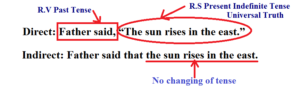
Direct: Father said, “The sun rises in the east.”
Indirect: Father said that the sun rises in the east.
Direct: Grandfather said to me, “Man is mortal.”
Indirect: Grandfather told me that man is mortal.
Direct: Rahit said to me, “I practice batting in this field daily.”
Indirect: Rahit told me that he practices batting in that field daily.
Direct: Your brother said to him, “My grandfather reads the Mahabharat every day.”
Indirect: Your brother told him that his grandfather reads the Mahabharat every day.
Rule No. 03
Reporting Verb Past Tense and Reported Speech More Than Two Past Tense
|
If we find two or more than two past indefinite tenses in the direct narration, those sentences are remained unchanged. |
Example:

Direct: The grandfather said, “My daughter was good and kind and she respected everyone.”
Indirect: The grandfather said that his daughter was good and kind and she respected everyone.
Narration Rules For Interrogative Sentences
We change the “Reporting Verb” of direct speech into indirect speech according to the tense at the time of narration change. I have mentioned the reporting verb below.
Interrogative Sentence
| Direct | Indirect |
| Say | Ask/Enquire/Want to know |
| [,] | If, whether |
| [?] | [.] |
When we change the direct speech of the interrogative sentences into the indirect, we use “Ask/Enquire/Want to know” instead of “Say”. Then we use “If/Whether” if the reported speech is yes no interrogative sentence. Next, we use a full stop instead of a question mark.
For Example:
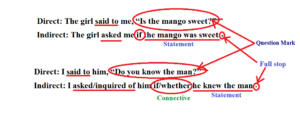
Direct: I said to her, ‘’Have you brought my book?
Indirect: I asked her if she had brought my book.
Direct: The man said to me, “Do you know the address?”
Indirect: The man enquired me whether I knew the address.
Direct: Rahim said to the girl, “Why are you shouting?’’
Indirect: Rahim asked the girl why she was shouting.
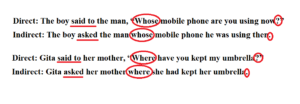
Direct: I said to Rabin, “When will you join the service?”
Indirect: I wanted to know Rabin when he would join the service.
Direct: The teacher said to the student, “Why were you absent yesterday?”
Indirect: The teacher wanted to know the student why he had been absent the previous day.
Narration Rules For Imperative Sentences
We change the “Reporting Verb” of direct speech into indirect speech according to the tense and reported speech at the time of narration change. I have mentioned the reporting verb below.
Imperative Sentence
| Direct | Indirect |
| Say | Order/request/advise/command |
| [,] | Aff- toNeg- not to |
Rule No. 01
| When we change the reported speech of imperative sentences, we use “Order/ request/ advise/ command” instead of “Say/ Say to”. Then we use “To” for affirmative sentences and “Not to” for negative sentences instead of comma marks. |
For Example:
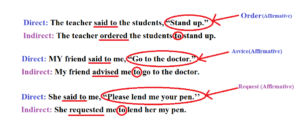
Direct: The teacher said to the students, “Stand up.”
Indirect: The teacher ordered the students to stand up.
Direct: The old man said to me, “Please help me.”
Indirect: The old man requested me to help him.
Direct: The teacher said to the students, “Respect the seniors.”
Indirect: The teacher advised the students to respect the seniors.
Direct: The cornel said to the soldiers, “March on.”
Indirect: The cornel commanded the soldiers to march on.
Direct: Mother said to me, “Do not wet in the rain.“
Indirect: Mother ordered me not to wet in the rain.
Narration Rules For Negative Imperative Sentences
Imperative Sentence
| Direct | Indirect |
| Say | Prohibit/forbid |
| [,] | To |
Rule No. 02
| If we find negative sentence in reported speech, we change “say/ say to” into “Prohibit/Forbid” and use “To” instead of comma mark in indirect narration. |
Example:
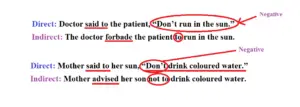
Direct: Mother said to her son, “Don’t drink coloured water.”
Indirect: Mother forbade /prohibited her son to drink coloured water.
Direct: My father said to me, “Don’t waste time.”
Indirect: My father forbade me to waste time.
Direct: The passerby said to the boys, “Don’t throw stones at the bird.”
Indirect: The passerby prohibited the boys to throw stones at the bird.
Narration Rules For Imperative sentence with ‘Let’
If we find “Us” after “Let” we should follow the below rules.
| Direct | Indirect |
| Say/ say to | Propose to/ suggest to |
| [,] | That |
| Let us | S+should+v…. |
Rule No. 03
| If we find “Us” after “Let” in the imperative sentence, we use “Propose to/ suggest to” instead of “Say/say to” and use that instead of the comma mark (,). Then we avoid “Let us” and follow sentence structure [S+ should +v…] |
Example:

Direct: He said to me, “Let us go out for a walk.’’
Indirect: He proposed to me that we should go out for a walk.
Direct: Our friends said to me, “Let us arrange a party.”
Indirect: Our friends proposed to me that they should arrange a party.
Direct: Tapan said to you, “Let us play cricket.”
Indirect: Tapan suggested to you that they should play cricket.
Narration Rules For Imperative sentence with ‘Let’ but ‘Us’ not follow ‘Let’
“Us” is not mentioned after let.
| Direct | Indirect |
| Say/say to | Tell/request/wish |
| [,] | That |
| Let | S+may/may+be+allowed+to+V+O…. |
Rule No. 04
| If we do not find “Us” after “Let” in the imperative sentence, we use “Tell/request/wish” instead of “Say/say to” and use “That” instead of the comma mark (,). Then we avoid “Let” and follow sentence structure [S+may/may+be+allowed+to+V+O….] |
Example:

Direct: He said, “Let me finish this work.”
Indirect: He wished that he might be allowed to finish that work.
Direct: The boy said to the man, “Let me write the answer.”
Indirect: The boy requested the man that he may write the answer.
Direct: I said to you, “Let her dance on the stage.”
Indirect: I told you that she might dance on the stage.
Narration Rules For Optative Sentences
We change the “Reporting Verb” of direct speech into indirect speech according to the tense at the time of narration change. I have mentioned the reporting verb below.
“God” is mentioned in the Optative sentence
| Direct | Indirect |
| Say | wish /pray/bless |
| [,] | that |
Rule No. 01
|
If we find the word “God” in the optative sentence we use “Wish / Pray/bless” instead of “Say”. Next, we do not use objects. We replace commas with “That”. Then we follow the sentence structure [S + may + v + o] at the time of narration change. |
For Example:
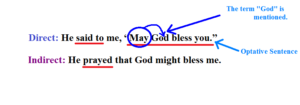
Direct: He said to me, “May God bless you.”
Indirect: He prayed that God might bless me.
Direct: He said, “May God punish him for his sins.”
Indirect: He prayed that God might punish him for his sins.
Direct: She said, “May God show you the right path.”
Indirect: She prayed that God might show you the right path.
The word “God” is not in the optative sentence
| Direct | Indirect |
| Say | wish |
| [,] | that |
Rule No. 02
| If we do not find the word “God” in the optative sentence we use “Wish” instead of “Say”. We replace commas with “That”. Then we follow the sentence structure [S + may + v + o] at the time of narration change. |
For Example:
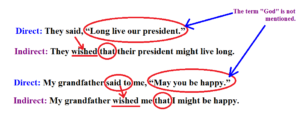
Direct: They said, “Long live our president.”
Indirect: They wished that their president might live long.
Direct: We said, “Long live our captain.”
Indirect: We wished that our captain might live long.
Narration Rules For Exclamatory Sentences
We change the “Reporting Verb” of direct speech into indirect speech according to the tense at the time of narration change. I have mentioned the reporting verb below.
Exclamatory Sentence
| Direct |
Direct |
Indirect |
|
say |
Hurrah | Exclaim with joy |
| Alas | Exclaim with sorrow/griefExclaim sorrowfully | |
| Surprise | Exclaim with surprise | |
| Greetings | Wish | |
| Desire | Strongly wish/desire | |
| Goodbye | Bid (Bade in past) |
Rule No. 01
| When we find greetings and goodbye in exclamatory sentences, we use “Wish/Bid”. After using those we do not use “That” but use the object. |
For Example
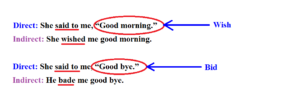
Direct: She said to me, “Good morning.”
Indirect: She wished me good morning.
Direct: Mother said to me, “Have a good result.”
Indirect: Mother wished me have a good result.
Rule No. 02
| If the reported speech starts with “How/ What” and we find an “Adjective/ Noun”, we use “Very / Completely” before the adjective and “Great” before the noun at the time of changing narration. |
For Example:

Direct: They said, “How happy we are here!”
Indirect: They exclaimed with joy that they were very happy there very happy there.
Direct: He said, “What a fool I am!”
Indirect: He exclaimed with sorrow that I was a great fool.
In case of happiness, gladness, sorrow and surprise
Rule No. 03
|
When we find happy, glad and surprise in exclamatory sentences, we use “exclaim with joy, exclaim with Sorrow/grief, exclaim sorrowfully, exclaim with surprise”. |
For Example:

Direct: The boys said, “Hurray! We have won the match.”
Indirect: The boys exclaimed with joy that they had won the match.
Direct: Simanta said, “Alas! I have lost the book.”
Indirect: Simanta exclaimed with sorrow/grief that he had lost the book.
Direct: The boy said to me, “What a smart girl!”
Indirect: The boy exclaimed with surprise me that the girl was very smart.
Direct: The man said, “Alas! My grandmother is no more.”
Indirect: The man exclaimed sorrowfully that his grandmother was no more.
In case of desire
Rule No. 04
| When we find desire in the exclamatory sentence, we use “strongly wish”. |
For Example:

Direct: The old man said, “Were I a king!”
Indirect: The old man strongly wished that he were a king.
Direct: Ramesh said, “Had I much money!”
Indirect: Ramen strongly wished that he had much money.
Narration Rules For The Vocative Sentence
Rule No. 01
| If we find the vocative sentence in reported speech, we can omit that or use “Addressing + NP”. All the rules of imperative sentences will be applied. |
For Example:
Direct: He said, “My friend, listen to me.”
Indirect: He told his friend to listen to him. Or
Addressing his friend, he told/requested him to listen to him.
Direct: He said, “Rahim, do not touch it.”
Indirect: He ordered Rahim not to touch it. OR
He prohibited/ forbade Rahim to touch it. OR
Addressing Rahim, he ordered him not to touch it. OR
Addressing Rahim, he prohibited/ forbade him not to touch it.
Narration Rules For The Sentences with “Sir” or “Madam”
Rule No. 01
| If we find “Sir” or “Madam” in the reported speech, we use respectfully instead of “Say/ Say to”. |
For Example:
Direct: The boy said to the teacher, “Sir, I can answer to this question.”
Indirect: The boy respectfully told the teacher he could answer to that question.
Direct: The girl said to the madam, “Madam, I could not understand it.”
Indirect: The girl respectfully told the madam that she could not understand it.
| To learn narration change of exclamatory sentences, click here…… |
Read More:
- Narration Change
- Voice change
- Type of sentence
- Degree Change
- All Conditional Sentences
- Transformation of Sentences [Affirmative to Negative]
- Transformation of sentences [Simple, Complex and Compound]
If you think that this article (Narration Rules) is good and necessary, you can share it with your friends and relatives through social media like WhatsApp, Facebook and Messenger. Thank you! – Prakash sir
